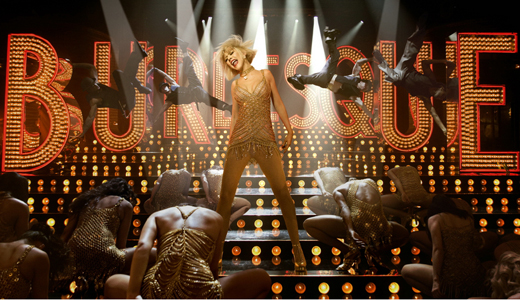It seems as though it is barely possible to release a pop record in the 21st century without also have a three-picture deal in the bag. Following in the footsteps of Britney Spears and Mandy Moore, former Mousketeer Christina Aguilera (or Xtina if you prefer) eyes Hollywood in Burlesque. Having already made her mark on movies in the form of numerous soundtracks, including Moulin Rouge, she teams up with Cher, another singer-turner-actress, to prove that she’s at least a double threat, if not a triple one.
Christina Aguilera plays Ali, a small-town Iowan looking to follow her dreams. Packing her bags and heading to Los Angeles, she pounds the pavement in search of any job in the singing and dancing realm. Walking past The Burlesque Lounge on Sunset Boulevard (“the best view on Sunset Strip with no windows”, the establishment proclaims), Ali is drawn inside, soon talking her way into assisting friendly bartender Jack (Cam Gigandet, Easy A). Although Tess (Cher, last seen in Stuck On You), the proprietor of The Burlesque Lounge, is dismissive of Ali’s desire to graduate from serving drinks to strutting her stuff on stage, a timely vacancy forces her to reconsider. With the encouragement of Sean (Stanley Tucci, The Lovely Bones), Tess’ right hand man, Ali gives it her best shot, winning fans when a vindictive act of sabotage by fellow dancer Nikki (Kristen Bell, Gossip Girl) forces her to unleash her vocal talents. Despite Ali’s success, the club still struggles to turn a profit, with the star and her mentor at risk of losing their venue to a charming real estate developer (Eric Dane, Grey’s Anatomy).
Burlesque is the kind of rags-to-riches story that we have seen so many times before. Complete with all the same bitchiness, the wrong and right kind of men and a girl who will do anything to get to the top, Burlesque is in many ways a santised version of Paul Verhoven’s Showgirls. Yet to dismiss it as such would be giving Burlesque too little credit, and giving the (admittedly satirical) Showgirls too much. Both films are part of a tradition in musical theatre and cinema that goes back at least as far 42nd Street (1933), where a chorus girl must replace a star at the last minute before hosting her own spotlight. It is an integral part of the American dream that anybody can grow up to be famous, and that is just one of the risks of being an American.
The storyline – with shifty property developers, a ticking clock to save the club and a surly old owner with a secret heart of gold – is paper-thin. Yet to view this film as having anything to do with plot or character development would be as naïve as a girl from Iowa. It’s about the song and dance routines, and acts as a showcase for modern diva Christina Aguilera. As such, much of one’s enjoyment of the film will depend on one’s Aguilera Tolerance™. Xtina’s vocal acrobatics are often less about singing than it is about proving the popster can hit a whole range of notes at sustained rate. In the film’s narrative, her character is out to prove that she can sing: here we are well into the second decade of the former Mouseketeer’s career, and she still seems desperate to prove to an audience that she can do the same. As ear-piercing as these elongated warbles can often be, they are powerful showstoppers and there is no denying that she has a captivating vocal presence both on-screen and off.
The musical numbers themselves are everything one would expect them to be: sultry but safe, new but vintage and with more than one tongue in cheek. This is a burlesque show after all. Growing in scale and sexiness as the show goes on (as it must), they become increasingly similar to the brand of music that Aguilera has associated with herself over the last few years, laying somewhere between the “Lady Marmalade” she did for Baz Luhrmann’s Moulin Rouge and her “risqué” videos for the Dirrty album. Indeed, cinematically the film falls roughly between Moulin Rogue and Chicago, but never quite achieving the innovation of the first or the black comedy of the latter. It is pure fluff entertainment, and in that regard, it does its job well.
Master of camp himself, Alan Cumming, makes an appearance in several numbers (one involving a banana), seemingly appearing out of thin air and disappearing from the story as soon as it is over. The presence of Cher (even if she does seem more like a female impersonator version of Cher these days) adds some real weight to the film, and we should never forget that for all the warbling and bad outfits, she is also an Oscar-winning actress. Indeed, most of the female characters are drawn quite well, with the possibly exception of Kristen Bell’s cookie-cutter pseudo-bitch, who doesn’t serve much of a purpose beyond the odd snarky remark. The men don’t fare quite as well, with Stanley Tucci settling into the ‘camp advisor to the determined matron’ role after similar turns in The Devil Wears Prada and Julie and Julia. Neither of the men in Ali’s life seem terribly appealing, with one a greedy tycoon from the 1980s and the other an ambiguously gay bartender cheating on his fiancée. Oh, what a lucky girl!
For all of its surface edginess, Burlesque is a return to a much older form of musical storytelling that has been absent from the screen for far too long. Infinitely watered down through High School Musicals and Glee, the musical has been more of a series of music videos than an actually spectacular combination of sound and vision. Burlesque doesn’t get the mix of story and sound entirely right, but it is a step in the right direction.
A bright and brash return to old-school musicals, hampered only by some predictable storytelling and the Aguilera Tolerance™ of the audience.
Burlesque was released by Sony Pictures Entertainment in Australia on January 20, 2011.





No Responses